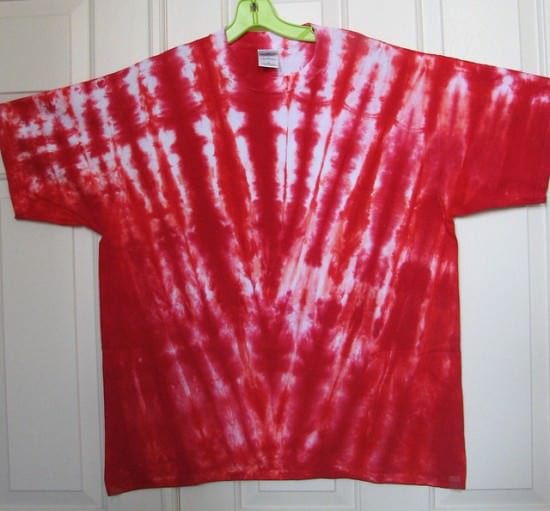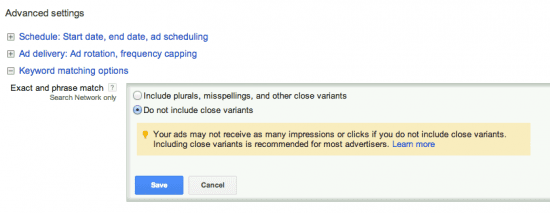 We find that keyword match types are an important aspect of Adwords that there is often confusion about. It is so fundamental that all Adwords customers understand this that I thought I would try and summarise it more clearly than Google do! We also cover the topic in more depth in the Smart Insights 7 Steps guide to improving AdWords ROI that I recently updated.
We find that keyword match types are an important aspect of Adwords that there is often confusion about. It is so fundamental that all Adwords customers understand this that I thought I would try and summarise it more clearly than Google do! We also cover the topic in more depth in the Smart Insights 7 Steps guide to improving AdWords ROI that I recently updated.
I will cover these two areas of good practice in this post:
- Keyword match types
- Negative keyword match types
It is worth doing this because; although negative keywords and standard keywords share the same basic match types (broad, phrase and exact) these terms actually have different meanings and functions with the two types of keywords.
1. Keyword Match Types
Exact Match
The users search term must exactly match a keyword in your account in order for your ad to show.
e.g. Keyword in account = [red shirt] then users search term must be exactly red shirt.
*There is an exception to this. If you have left your campaign setting on the default "Keyword matching options" then an exact match keyword can also pick up searches from plurals, mispellings and other close variants.
We always opt to switch this to "Do not include close variants" as we want to be 100% clear on what we can expect from exact match keywords.
Here is a screenshot of this setting in the Campaign Settings page of an Adwords account:

Phrase Match
The users search term must contain the exact phrase/sequence of words in your keyword.
For Example:
Keyword = "red shirt" then the users search term must contain red shirt. It may also contain any other words prior to or following the keyword.
Here are some examples of potential matches:
buy a red shirt
wash a red shirt
will people laugh at me if I wear a red shirt
*The same exception as we discussed above with regards to exact match is also true for phrase match. The one setting controls both exact and phrase match.
Broad Match
Any of the words or implied meanings of the words in your keyword may trigger your ad to show for a users search.
For example:
Keyword = red shirt then the users search term could contain either red or shirt or even a similar word with a similar meaning.
Here are some examples of potential matches:
red shoes
big shirt
bright shirt
buy a red shirt
I put in some quite extreme examples here to show exactly how much control you put in the hands of Google when you opt to use broad match keywords. To be fair to Google they have such a good understanding around the intent of searches that a large percentage of broad keywords match quite well to search queries.
But with that said there is always a large percentage of trash thrown in too.
Broad Match Modified
All of the words that are pre-fixed with a + must be present in the users search term. You can prefix one or more words in your keyword.
I will give two examples here:
1) All keywords prefixed with a +
e.g. +red +shirt
This could potentially match to:
cheap red shirt
I washed my clothes with a red shirt and now they are wrecked
red trousers to go with my white shirt
2) Some words pre-fixed with a + and some not
e.g. cheap +red +shirt
This could potentially match to:
Cheap Ralph Lauren red shirt
Second hand red shirt
Vintage white shirt with red stripes
When it comes to using broad match we always pre-fix every word in a keyword with a + so that they are all fully modified.
*Broad Match Modified can appear similar to phrase match but hopefully through the examples used here it is clear that word order is the difference.
With phrase match, the keyword must match part of the users search term exactly and in the same order, whereas with broad match modified the same words must be present, but in any order.
Once you have 3 words or more in a keyword the difference becomes negligible but for high volume terms with 2 words there is a significant difference.
2. Negative Keywords
There are 3 types of negative keywords; broad, phrase and exact match.
The tricky thing is that they do not mean exactly the same thing as they do with standard keywords.
Negative Exact Match
A negative exact match keyword must exactly match the users search term in order for an impression not to be triggered.
For example if you have an ad group with a single keyword of:
+red +shirt
and a negative exact match keyword of
-[ladies]
As you want to stop all searches for ladies red shirts then you will be out of luck. This negative keyword would only stop a search for the word ladies but as the keyword has stated that the users search must contain both "red" and "shirt" this negative keyword would be pointless.
If you put it in as either a phrase "ladies" or a broad match ladies negative keyword then you will block all search terms that contain the word "ladies".
BUT - say for example you had 2 ad groups for the keyword red shirt.
Firstly you have one ad group with the exact match keyword [red shirt] only and the purpose of that ad group is to only pick up searches for that exact term.
You then have another ad group with the broad match modified keyword +red +shirt and the purpose of this is to pick up all searches that include both these words but that do not include the exact search for red shirt.
You therefore need to use the exact match negative -[red shirt] on the ad group containing the broad match modified keyword. It will stop this ad group from showing an ad for that search and push the user to the exact match ad group.
But it will still allow all other searches through that contain both red and shirt.
Negative Phrase Match
This will only block a users search from triggering an ad if the user searches a keyword that includes this phrase.
For example for a negative phrase match keyword of -"red shirt" no ads will be elibible to show if they include the term "red shirt" with the keyword.
This could block searches such as:
buy a red shirt
sell a red shirt
red shirt and tie
But it will not block searches for things like:
red trousers and shirt
A good use case for this is when you have an ad group for Red Shirt and then many other long tail ad groups for brand + red shirt for a range of brands that all supply red shirts to your website.
You could add all of the brand names to the main red shirt ad group as negative phrase matches. this will stop that ad group from picking up those searches and will force them to the specific brand + red shirt ad group.
Negative Broad Match
Your ad will NOT show any time that a users search term includes the whole of a broad match negative keyword that you have in the ad group or campaign.
For example you have the broad match negative keyword of -red shirt
This will block any searches for terms including red shirt or shirt red but it could still trigger ads for blue shirt.
Use of broad match negative is, like standard broad match, slightly ambiguous as you leave it to Google to determine exactly what to block in many cases.
If you have any questions following this post then please leave them in the comments section and I will answer them quickly as real life examples are the best way to explain this.

Thanks to
Joel Chudleigh for sharing his advice and opinions in this post. Joel Chudleigh is CEO and Founder at
Deep Footprints, which is a digital agency focused on PPC and SEO through a holistic approach. That means that they really understand the need to know their clients’ businesses and products/services inside out to understand how to best market them. You can follow him on
Twitter or connect on
LinkedIn.








